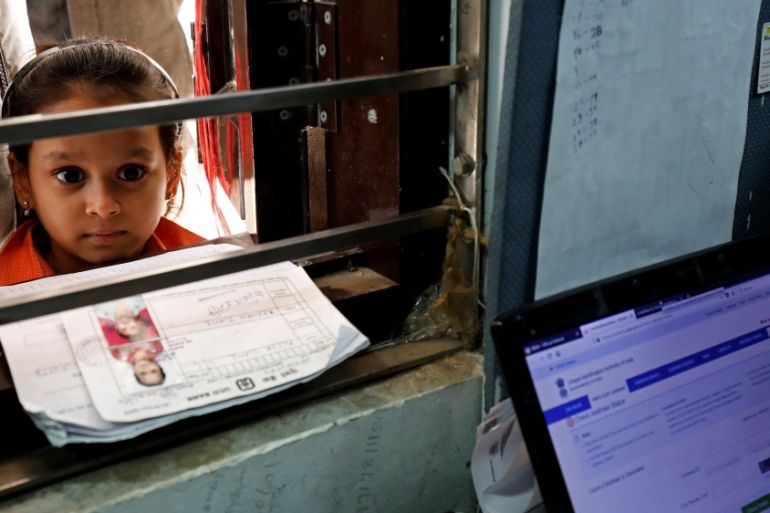India’s top court upholds constitution validity of Aadhaar card
Top court rules in favour of national identity card project, but bars private companies from accessing the data.

New Delhi, India – India’s top court on Wednesday upheld the constitutional validity of a controversial national ID (Aadhaar) card project after hearing extensive arguments around surveillance and privacy concerns.
The top court was examining the constitutional validity of Aadhaar, whether or not citizens can be forced to enrol, and whether the government can make it mandatory to connect these IDs to bank accounts and mobile phones.
The top court barred private companies from accessing the data and also directed that schools, banks and telecom companies cannot make Aadhaar mandatory for availing their services.
A dissenting judge on the five-judge bench, however, said the project “in its entirety is unconstitutional”.
A majority judgement of three judges, was, however, not convinced that Aadhaar violated the right to privacy.
“Data obtained is very very minimal, the benefits especially to marginalised is large,” said Justice AK Sikri reading out the judgement.
The world’s largest biometric database, named Aadhaar after a Hindi word for ‘foundation’, was originally labeled as a tool to help welfare services reach poorer citizens.
But subsequently it began to be used by banks, telecom firms, credit checking firms, and other private companies to validate identities of customers.
Compelling people to enrol violated free and informed consent, senior lawyer Shyam Divan had argued in the top court during the hearings.
“My fingerprints and iris are my own. As far as I am concerned, the state cannot take away my body,” he said.
The five-judge constitution bench heard arguments challenging the constitutional validity of Aadhaar for 38 working days this summer.
In their arguments against Aadhaar, petitioners had also referred to Britain’s decision to scrap a similar national ID card project in 2011, seen as an “erosion of civil liberties”.
The ruling Bharatiya Janata Party (BJP) welcomed the Supreme Court ruling on Wednesday.
“The only agenda of the government was to include people under the gamut of a welfare structure without misusing any of the data. The people at large know what the government of the day is trying,” BJP leader Shaina NC told Al Jazeera.
Privacy concerns
The Aadhaar IDs record personal biometric data, including fingerprints and eye scans, which the government says allows it to ensure that welfare services are being delivered to those who really need them.
But several high-profile leaks of citizens’ data have raised privacy concerns.
Critics had warned that the public’s privacy is at risk, claiming Aadhaar cards would link a large amount of data, without clear safeguards for access or use by government or private companies.
They say that Aadhaar would allow authorities to create a full profile of a person’s spending habits, phone records, banking records, rail bookings, property ownership and a trove of other information.
Privacy campaigners expressed their disappointment over the latest verdict.
“It’s disappointing that Aadhaar has not been held unconstitutional,” Nikhil Pahwa, co-founder of Indian advocacy group Internet Freedom Foundation, told Al Jazeera. “The court seems to have agreed with the government and the body running Aadhaar on the debate around security and large linkages, even though we know that this project is a national security risk for India.”
“The fact that private parties can no longer demand this ID is a positive note,” he added.
![The government says the project will lead to a 'social revolution' [Sanjeev Gupta/EPA]](/wp-content/uploads/2017/12/52d87488de814c5da6dbde637a6e5f78_18.jpeg)
Wednesday’s ruling was preceded by a landmark judgement by the Supreme Court that declared privacy a fundamental right, a move interpreted as a setback to the government’s plans for Aadhaar.
Recent security lapses with data have highlighted how easy it is for things to go wrong.
In January this year, the Unique Identification Authority of India (UIDAI), which runs the Aadhaar project, initiated a police probe into a major security breach after a local newspaper accessed a database containing the identity details of more than one billion citizens, which was being sold for a meagre $8.
An anonymous seller over WhatsApp created a “gateway” for one of the newspaper’s correspondents to gain access to the database, after which any identification number, referred to as Aadhaar, could be entered and the person’s name, address, photo, phone number and email displayed.
Earlier last year, India’s junior information technology minister told parliamentarians that 210 government websites had mistakenly published several citizens’ personal data.
The UIDAI says that more than 1.13 billion people are enrolled on the database. India’s finance minister says there have been 20 reported cases of Aadhaar-related bank fraud since 2015.
Apart from privacy concerns, India’s poor, often denied access to social welfare schemes unless they can furnish an Aadhaar ID, are particularly vulnerable.
Several Aadhaar-linked hunger deaths have been reported across India, including in Jharkhand’s Simdega district where an 11-year-old girl died of starvation last year, months after her family’s ration card, similar to welfare coupons in the US, was cancelled because they did not possess an Aadhaar number.
“The Aadhaar project has failed to remedy the flaws in it’s design and has led to exclusion. Denying social welfare is a violation of fundamental rights of citizens,” Justice Chandrachud said in Wednesday’s ruling.
But, the government says the project will lead to a “social revolution”.
“Within reach of the country is what might be called the 1 billion-1 billion-1 billion vision,” Arun Jaitley, India’s finance minister said last year.
“That is 1 billion unique Aadhaar numbers linked to 1 billion bank accounts and 1 billion mobile phones. Once that is done, all of India can become part of the financial and digital mainstream.”